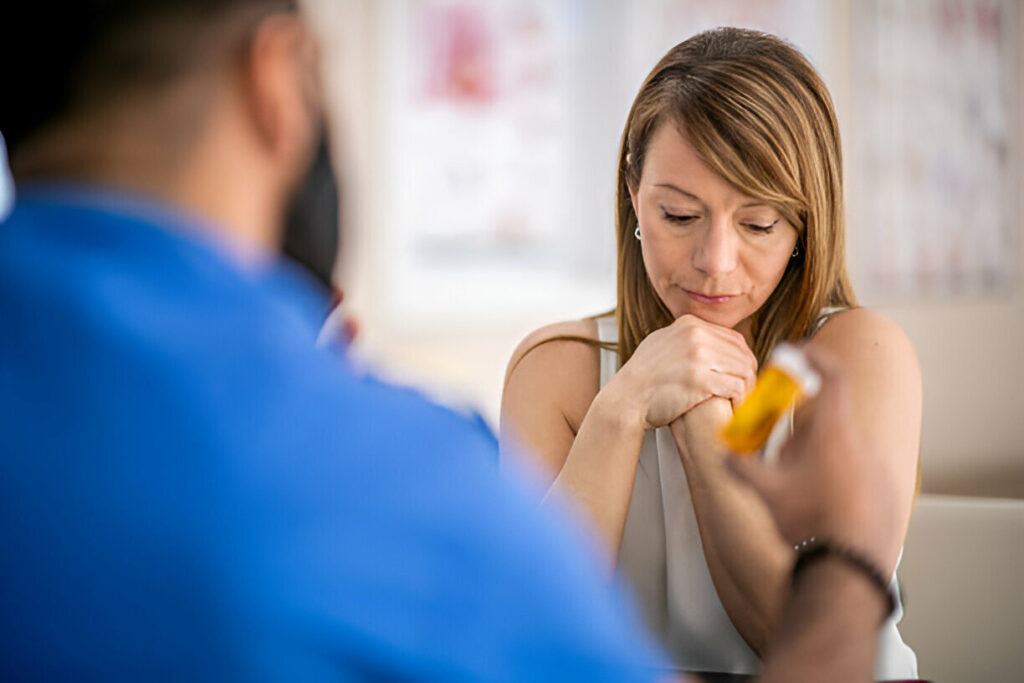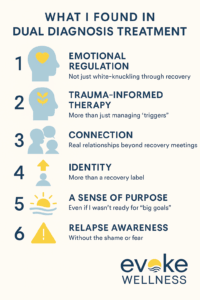If you’re newly sober and feel more confused than healed, this is for you.
You might be doing all the “right” things—staying clean, attending meetings, breathing through the anxiety—but something still feels off. You’re not using anymore, but you’re still unraveling.
You’re not broken. You’re in between. And for people in that fragile space, a dual diagnosis treatment program can be a lifeline—not because it treats “two things at once,” but because it finally treats the stuff underneath.
Let’s break that down.
1. Emotional Regulation: Because White-Knuckling Isn’t a Strategy
When you first got sober, every day was a victory. Now, you feel… unsteady. The tiniest things make your chest tighten or your brain spiral.
That’s not you being dramatic. That’s your nervous system still stuck in survival mode.
A dual diagnosis program teaches you emotional regulation tools that actually stick. We’re talking:
- Dialectical Behavior Therapy (DBT)
- Somatic techniques
- Psychoeducation about how your brain works
Because you don’t just need to be sober. You need to know how to stay sober when your emotions come in swinging.
2. Identity: More Than a Recovery Label
You’ve introduced yourself a thousand times with your sobriety date. But who are you beyond that?
Recovery isn’t your whole identity. And yet, it can feel like the only thing people see.
Dual diagnosis care creates space to explore your full self—interests, passions, fears, questions. You’ll start to rebuild your identity from the inside out, not just as someone who survived addiction, but someone who’s learning to live again.
3. Nervous System Rewiring: Because Triggers Are More Than Temptations
Ever feel completely fine—and then suddenly not?
Maybe it’s a smell. A tone of voice. A loud room. You don’t even know what happened, but your body goes into panic mode.
That’s a nervous system loop. Your brain thinks you’re back in danger and your body believes it.
Dual diagnosis treatment helps retrain that system. Through trauma-informed therapy, breathwork, and movement, you start to recognize those cues not as commands, but as clues. And you learn how to respond instead of react.
4. Connection That Feels Real—Not Performed
Support groups work for many people. But if you’re young and sober, you’ve probably had at least one moment where you felt like the “weird one” in the room. Too young, too new, too different.
In dual diagnosis care, connection is deeper and slower. You’re not just thrown into a circle and expected to spill your soul. You’re offered consistent, honest relationships—through peers, mentors, and clinicians who’ve walked similar roads.
No pressure to perform. Just permission to be exactly where you are.
5. A Sense of Purpose—Even If You’re Not Ready for Big Dreams
Not everyone walks out of treatment wanting to change the world. Sometimes you just want to know what your next week looks like.
Dual diagnosis care meets you there.
Whether it’s through small goals, creative expression, volunteer work, or job coaching, the focus is on helping you find a purpose that doesn’t overwhelm you—but anchors you.
You don’t have to “have it all figured out.” You just need a thread to follow.
6. Relapse Awareness That Doesn’t Feel Like a Threat
Many programs talk about relapse like it’s the enemy. But for a lot of people—especially in early recovery—relapse is part of the story.
A dual diagnosis treatment program doesn’t just fear relapse. It prepares you for it:
- What your early warning signs look like
- What to do with a craving besides feel ashamed
- How to re-engage with support, even after slipping
This isn’t a scare tactic. It’s emotional self-defense.
Because knowing yourself better is the real prevention.
7. Mental Health Isn’t an Afterthought—It’s the Foundation
Here’s the big one: dual diagnosis care doesn’t treat your substance use in a vacuum.
It digs into:
- The anxiety that made you reach for something to quiet your mind
- The trauma that convinced you you were unworthy
- The depression that made getting out of bed feel like a war
If those things go untreated, sobriety becomes another performance. But when they’re addressed—really, safely, and consistently—you’re not just clean. You’re clearer.
Frequently Asked Questions About Dual Diagnosis Treatment
What exactly is a dual diagnosis treatment program?
It’s a form of care that treats both mental health issues and substance use disorders together. That means you don’t have to bounce between a therapist for your anxiety and a recovery coach for your sobriety. It’s all one team.
Is it just for people with a mental illness diagnosis?
Not necessarily. If your emotional health, trauma, or mental state is part of your addiction story—or part of what’s keeping you from staying sober—this kind of care is relevant and helpful.
Do I have to be using right now to qualify?
No. Many people enter dual diagnosis care after getting sober. In fact, early recovery is often when mental health struggles show up loudest—so it’s an ideal time to get support.
What does treatment look like day to day?
It depends on the level of care. Residential programs may include individual therapy, group sessions, skill-building workshops, and medical support. Outpatient programs offer more flexibility but with the same integrated approach. At Evoke Wellness Ohio, we help you choose what fits your needs best.
Still feeling like the odd one out? You’re not. You’re just early in the process.
Call (866) 430-9267 or visit our dual diagnosis treatment program page to learn more about how we help young adults in Hilliard, Ohio reconnect with who they are—not just who they’re trying to stay sober for. You’re not just healing. You’re becoming.



